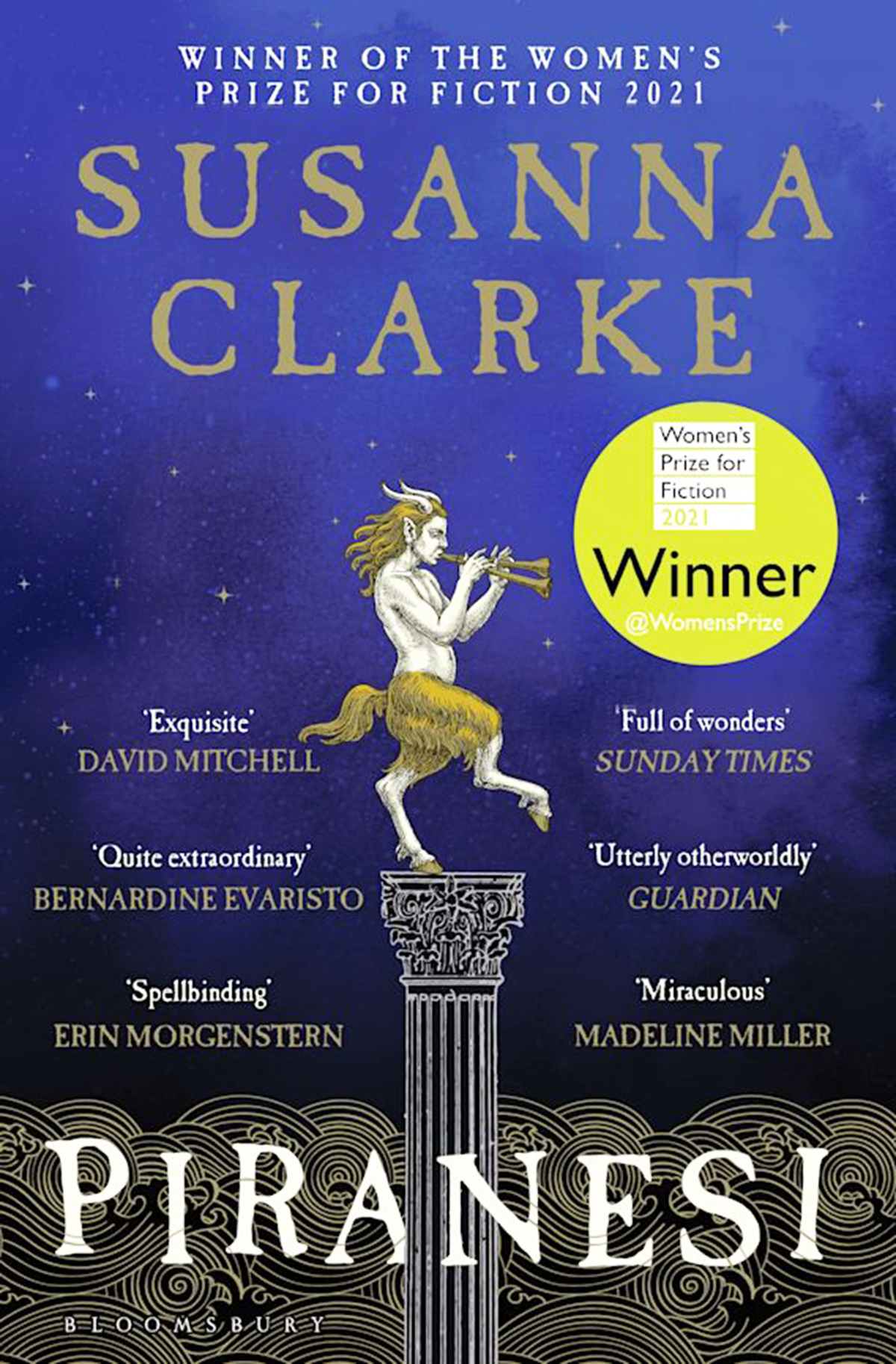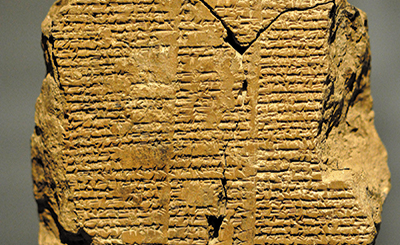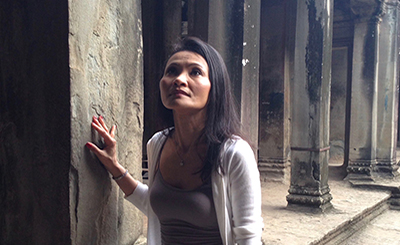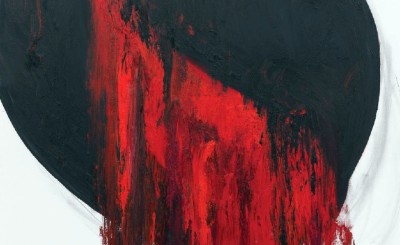
Susanna Clarke. Photo: Sarah Lee. Courtesy: www.womensprizeforfiction.co.uk/
Piranesi’s being and becoming, a peculiar mélange of the surreal and the earthly, is the state of mind all of us have longed to achieve, especially during the pandemic
Susanna Clarke took the literary world by storm with her groundbreaking debut novel, Jonathan Strange and Mr. Norrell (2004), which was a fantastical historiographic account of magic in Regency-era England. Neil Gaiman describes it as the finest fantasy novel of the last seventy years. The 782-page epic, which was published in more than 34 countries and also made it to the Booker Prize longlist, was adapted into a mini-series by the BBC. After a long hiatus due to her chronic illness, Clarke returned with the spellbinding Piranesi in 2020 which has bagged the 2021 Women’s Prize for Fiction. Partly heart-warming, partly heart-breaking and wholly magical, Piranesi is an astonishing tale set in a world unlike any other and narrated with bewitching candour and sincerity. Not only does it go beyond the conventional tropes of incantations, witchcraft and sorcery but arms itself with questions that the readers would have a hard time answering.
“Anyone who’s read Narnia as a child, for whom it is a formative book, constantly is aware that they have that desire — one day, there will be the wardrobe. Something that will take you there. It’s a very old longing in me”, Clarke told The Guardian. Piranesi, indeed, is the wardrobe that transports the reader to a surreal world, except that it’s not the quintessential land of fairies and unicorns, witches and wizards, flying wagons and weeping trees, it’s unknown to us, baffling at first with the descriptions of the Eight-Hundred-and-Sixtieth Hall to the West or the Seven-Hundred-and-Sixty-Eighth Hall to the South which the eponymous protagonist has travelled to. But, gradually, we are drawn into the wonders of the world that he inhabits; it’s a world beyond ordinary imagination, the world that Piranesi calls the House. The infinite marbles halls are lined with beautifully crafted statues, clouds float in the upper halls while animated seas carpet the lower halls, enraptured by the company of birds who fly through the illuminated skies, he braves the vagaries of the capricious tides. He, along with another man whom he calls the Other, populate the middle halls. Piranesi believes that only fifteen humans ever have inhabited the World, himself and the Other being the only living humans, rest of them being dead.
He describes himself as “a scientist and an explorer” and meticulously records his observations about the statues, constellations, tides and every other object or event which intrigues him in his journals. Having devised his own calendar, he names years with the outstanding happening of that particular year: ‘the year the albatross came to the South-Western halls’, ‘the year I named the constellations’, ‘the year I discovered the Coral halls’ and so forth. He meets the Other, his colleague and friend, a scientist like him, on regular intervals and assists him in the research for discovering the “Great and the Secret Knowledge” which the Other says is hidden somewhere in the House and can grant them exceptional powers like becoming immortal, flying like eagles, telepathy, controlling the lesser intellects and so forth. The Other also gifts Piranesi various things — an odd combination of random stuff, like bottles of multivitamins, matches, shoes, notebooks, pens, fishing nets, etc. Piranesi greatly admires him for his commitment to his work and values his friendship despite his laconic and detached nature. But, eventually, he comes to realise his disinterest in the project: “I realized that the search for the Knowledge has encouraged us to think of the House as if it were a sort of riddle to be unravelled, a text to be interpreted, and that if we ever discover the Knowledge, then it will be as if the Value has been wrested from the House and all that remains will be mere scenery”.

Piranesi
By Susanna Clarke
Bloomsbury
pp. 245, Rs 699
Piranesi adores the House, he is the only one who is not only well-versed with the wide swathes of that colossal place, but understands it for what it is; there’s always something enchanting to be discovered — a hall to be visited, tides to be analysed or, simply, fish to be gathered for supper. “I have known for many years that the Other does not revere the House the same way that I do, but it still shocks me when he talks like this. How can a man as intelligent as him say that there is nothing alive in the House.” Unlike the Other, for whom the House is a bleak and desolate place, just a means to his selfish ends, for Piranesi the House is bubbling with life. He brings food, water and water lilies to the dead, he talks to them and keeps them clean and in comfort. He even goes ahead to give dried seaweed, amounting to three days’ worth of fuel, to the family of albatrosses so that they can build themselves a nest and keep their eggs warm, being well aware of the possibility of himself going cold for a few days. The constantly moving tides, the fishes and the sea vegetation, the birds and their droppings, the ubiquitous statues, are all pieces which coalesce to make the House a lively mosaic for him. “The Beauty of the House is immeasurable; its Kindness infinite”, Piranesi notes down in his journal.
He reaches out to the statues for solace and they miraculously save him from tempestuous tides. When battling with the possibility of going mad, he flings himself into the arms of the Faun, his favourite statue, “wrapping my arms around his neck, intertwining my fingers with his fingers. Safe in his embrace, I wept for my lost sanity”. Even though he is thrilled by the idea of the company of more living people, he is not burdened by a sense of alienation, he’s in harmony with his surroundings, a joyous part of a rather enigmatic whole. “The world feels Complete and Whole, and I, its Child, fit into it seamlessly. Nowhere is there any disjuncture where I ought to remember something but do not, where I ought to understand something but do not.”
Ironically, there are missing pieces in the puzzle of which Piranesi is a part of. He does not know his own name, for as long as he can remember, he has been called Piranesi as some sort of joke by the Other which he doesn’t understand because of his unawareness of the world beyond the House. Clarke talks about her fascination with Giovanni Battista Piranesi, an 18th century Venetian architect and artist who’s renowned for his intricate etchings of imaginary prisons, in an interview with Madeline Miller, the source of the Other’s joke. While the Other might derive some secret joy by thinking of Piranesi as a captive in a magnificent prison, the joke’s actually on him since Piranesi has discovered his joy, his home, he considers himself “the beloved child of the house” whereas the Other, despite having discovered an alternative world, is content in neither; he, in the truest sense, is a prisoner of his egotistical and malevolent desires, his dubious morality.
Labyrinthine and mysterious, Piranesi’s innocence and earnestness charms us, even the magic of spells would be pale in its reflection. Yet, it is not for the faint-hearted and the absent-minded, for, as much as it mesmerizes with a story like no other, the questions at its heart would haunt the reader. Clarke, who has been housebound for more than a decade, seems to be prodding us to question the unease most of us found ourselves grappling with as we were plunged into solitude due to the lockdown. While Piranesi wanders through endless halls all alone, braving tides and descending staircases into the unknown in a quotidian fashion, we are compelled to have our moments of meditation despite an innate fear of losing ourselves into a whirlpool of soul searching. Isn’t the figure of the eccentric scholar obsessed with finding an alternative world and restoring the wisdom of the ancients chained to the depths of his own darkness whereas a Piranesi, who doesn’t even know that another world exists, out of Plato’s allegorical cave? With his ability to ascribe meaning, identifying oneself with a purpose, having a profound sense of belonging, finding liberation in loneliness, Piranesi has a sight that most of us, if flung into the House, would be devoid of. It’s as if Piranesi is the spirit incarnate of a Pecola who were granted the bluest eyes she so earnestly desired for in Toni Morrison’s The Bluest Eye (1970) and the world became a better place, for, the very act of seeing was transformed. Piranesi’s being and becoming, a peculiar mélange of the surreal and the earthly, is the state of mind all of us have longed to achieve, especially during the pandemic.
More from The Byword
Comments
*Comments will be moderated











